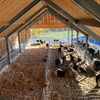Wood pellets lost amid recent low energy rates
Demand was slack for the wood pellet industry this past winter, due to continued low oil prices and an average winter, says Maine Pellet Fuels Association Executive Director Bill Bell.
The pellet industry took off eight years ago, when pellet boilers and stoves became available and forest product companies in Maine began looking at the fuel as a strong new market.
“Maine very quickly became the leading state in the country for producing pellets for domestic use,” Bell says.
The industry got a boost through the American Recovery and Reinvestment Act of 2009, which awarded $11.4 million to the Maine Forest Service to fund pellet boiler installation projects in municipalities, schools, colleges, universities and a hospital. Those projects, says Bell, stimulated further interest among residential customers. Efficiency Maine subsequently instituted an incentive program that initially offered a $5,000 rebate for residential users who were installing pellet boilers; today, the rebate is $3,000.
Wood pellet use in Maine is still a relatively small part of the market. Bell estimates about 1,000 homes have pellet heat, and about 40 institutions, with the Jackson Laboratory in Bar Harbor as the biggest consumer. Homeowners use eight to 10 tons of pellets for central heating, and three to four tons for pellet stoves, per year.
The industry's target is to have 10% of the homeowner market.
“The problem is, three winters ago, you couldn't get enough pellets, and you had pellet firms making huge investments in upgrading their equipment in order to meet demand,” Bell says. “Then the price of oil dropped significantly.”










Comments